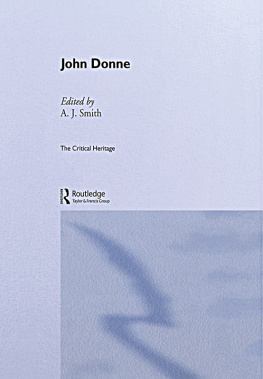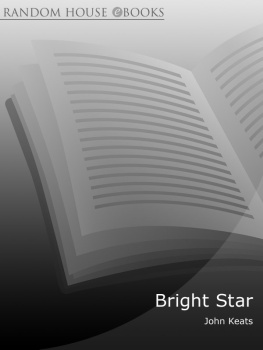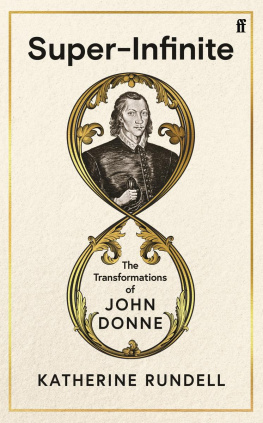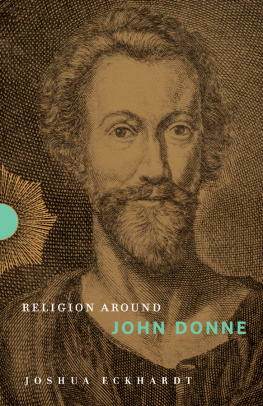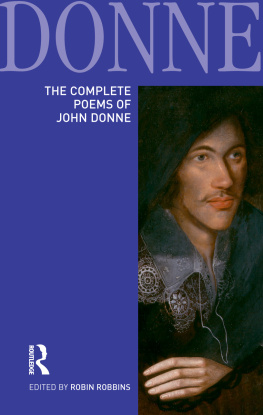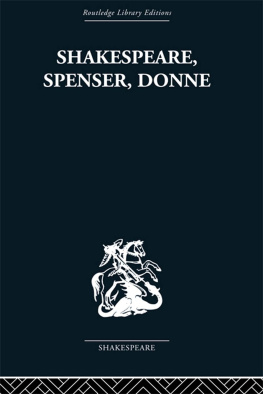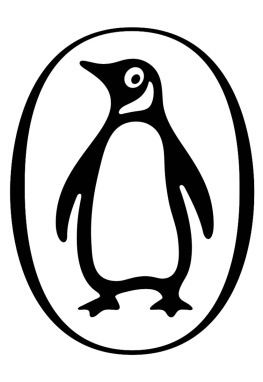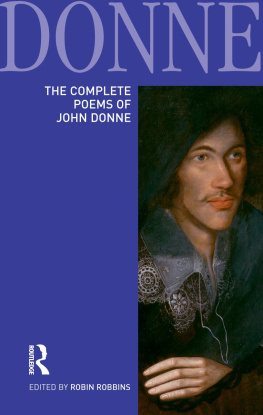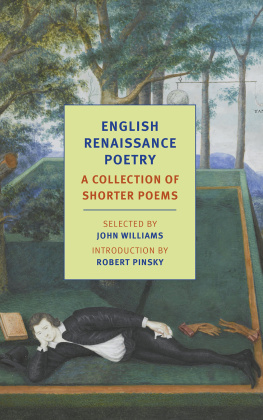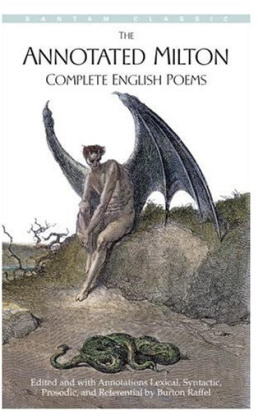A. J. Smith. - John Donne: the complete English poems
Here you can read online A. J. Smith. - John Donne: the complete English poems full text of the book (entire story) in english for free. Download pdf and epub, get meaning, cover and reviews about this ebook. City: London, year: 2005, publisher: Routledge;Folio Society, genre: Detective and thriller. Description of the work, (preface) as well as reviews are available. Best literature library LitArk.com created for fans of good reading and offers a wide selection of genres:
Romance novel
Science fiction
Adventure
Detective
Science
History
Home and family
Prose
Art
Politics
Computer
Non-fiction
Religion
Business
Children
Humor
Choose a favorite category and find really read worthwhile books. Enjoy immersion in the world of imagination, feel the emotions of the characters or learn something new for yourself, make an fascinating discovery.
- Book:John Donne: the complete English poems
- Author:
- Publisher:Routledge;Folio Society
- Genre:
- Year:2005
- City:London
- Rating:3 / 5
- Favourites:Add to favourites
- Your mark:
- 60
- 1
- 2
- 3
- 4
- 5
John Donne: the complete English poems: summary, description and annotation
We offer to read an annotation, description, summary or preface (depends on what the author of the book "John Donne: the complete English poems" wrote himself). If you haven't found the necessary information about the book — write in the comments, we will try to find it.
John Donne: the complete English poems — read online for free the complete book (whole text) full work
Below is the text of the book, divided by pages. System saving the place of the last page read, allows you to conveniently read the book "John Donne: the complete English poems" online for free, without having to search again every time where you left off. Put a bookmark, and you can go to the page where you finished reading at any time.
Font size:
Interval:
Bookmark:
General Editor: B. C. Southam
The Critical Heritage series collects together a large body of criticism on major figures in literature. Each volume presents the contemporary responses to a particular writer, enabling the student to follow the formation of critical attitudes to the writer's work and its place within a literary tradition.
The carefully selected sources range from landmark essays in the history of criticism to fragments of contemporary opinion and little published documentary material, such as letters and diaries.
Significant pieces of criticism from later periods are also included in order to demonstrate fluctuations in reputation following the writer's death.
THE CRITICAL HERITAGE
Edited by
A. J. SMITH

London and New York
First Published in 1983
Reprinted by Routledge in 1995, 1998, 2000
2 Park Square, Milton Park,
Abingdon, Oxon, 0X14 4RN
&
270 Madison Ave,
New York NY 10016
Transferred to Digital Printing 2005
Routledge is an impnnt of the Taylor & Francis Group
Compilation, introduction, notes and index 1983 A. J. Smith
All rights reserved. No part of this book may be reprinted or reproduced
or utilized in any form or by any electronic, mechanical, or other means,
now known or hereafter invented, including photocopying and recording,
or in any information storage or retrieval system, without permission in
writing from the publishers.
British Library Cataloguing in Publication Data
ISBN 0-415-13412-9
The reception given to a writer by his contemporaries and near-contemporaries is evidence of considerable value to the student of literature. On one side we learn a great deal about the state of criticism at large and in particular about the development of critical attitudes towards a single writer; at the same time, through private comments in letters, journals or marginalia, we gain an insight upon the tastes and literary thought of individual readers of the period. Evidence of this kind helps us to understand the writer's historical situation, the nature of his immediate reading-public, and his response to these pressures.
The separate volumes in the Critical Heritage Series present a record of this early criticism. Clearly, for many of the highly productive and lengthily reviewed nineteenth- and twentieth-century writers, there exists an enormous body of material; and in these cases the volume editors have made a selection of the most important views, significant for their intrinsic critical worth or for their representative quality perhaps even registering incomprehension!
For earlier writers, notably pre-eighteenth century, the materials are much scarcer and the historical period has been extended, sometimes far beyond the writer's lifetime, in order to show the inception and growth of critical views which were initially slow to appear.
In each volume the documents are headed by an Introduction, discussing the material assembled and relating the early stages of the author's reception to what we have come to identify as the critical tradition. The volumes will make available much material which would otherwise be difficult of access and it is hoped that the modern reader will be thereby helped towards an informed understanding of the ways in which literature has been read and judged.
B.C.S.
An account of our heritage of Donne criticism must cover a whole cycle of his fortunes, bringing together opinions of his poetry from its earliest days to recent times. The present volume collects the known evidence of Donne's reputation as a poet, and of the reputation of his poems, down to the 1880s. It admits comments on his prose writings only when they bear upon the poetry too. General discussions of metaphysical poetry are not included unless they directly refer to Donne. This record of Donne's reputation breaks off just before his poetry returned to general esteem and a modern view of it began to emerge. In some ways the most striking of all developments in Donne criticism came about between the 1890s and the 1920s. But to cover that period a further volume of extracts would be needed.
Few of the items given here have critical value in themselves or offer fresh insights into the poems. The book is simply intended to show what people have made of Donne's poetry over several hundred years and how opinions of it have shifted in that time; though it naturally reflects the tastes or canons of the commentators and the way tastes and canons change. Donne has challenged his critics from the first, so that the successive revaluations of him tend to mirror changing critical assumptions.
Completeness is too much to hope for. But I have not knowingly omitted any germane comment on Donne's poetry in the period; and the volume records the comments which have so far come to light. Of the many scholars who have located references I am particularly indebted to Sir Geoffrey Keynes, A. H. Nethercott, Professor W. Milgate, Professor R. G. Howarth, Professor K. Tillotson, Professor J. E. Duncan.
A.J.S.
For allowing me to print passages from materials in their custody, or copyright, I am obliged to the Director of the Houghton Library of Harvard University and to the Director of the Duke University Press. I acknowledge help given me by the staffs of libraries in Britain and America, and especially the university libraries at Swansea and Keele. The University College of Swansea and the University of Keele have assisted me with research grants, for which I am grateful. My particular thanks are owed to the following people who supplied me with references or material : Mr A. P. Burton, Assistant Keeper of the Library of the Victoria and Albert Museum, Mr W. P. Ingoldsby of the Huntington Library, California, Dr Peter King, Mr J. L. Hermans, Mr Tom Davies, Mr Kevin Barry, Mr Michael Munday, Professor S. Schoenbaum, my erstwhile colleague Mr F. M. Dohcrty, and Mrs Mabel Potter.
As late as the 1880s Swinburne in England and Lowell in America independently wondered at the arbitrariness of literary reputation when they found so magnificent a poet as Donne still widely unacknowledged. That a great poet should cease to be recognised as such and for donkeys' years go belittled or neglected is a phenomenon that needs explaining. Was there a general aberration of taste? Did his times and concerns peculiarly cut him off from the eras that followed? The myth of Donne the modern has long been the received answer to these questions. It was a conscious modernism, partly defining itself by Donne, which credited Grierson and Eliot with the rediscovery of his poetry and hailed his return as the recovery of a lost mode of sensibility, or the harbinger of an intellectual revolution like the one he himself's supposed to have led. People still make it an article of faith that Donne's poems had a fashion in his own day and just after, then fell wholly into neglect until recent times when our like predicament showed us ourselves in them. We may acknowledge that our times have their distinctive view of Donne and yet require these assumptions to submit to the facts.
What admits no dispute is that Donne's poetry has come back into a general esteem in the present century such as it had not enjoyed since the time of Charles Ithat his fame came full circle from Carew's day to Eliot's. But general esteem isn't all that matters, or even what matters most. The truth about Donne's reputation, as one finds it in particular responses to the poems, is far from simple. Such sharp differences of attitude as appear in the documents that follow don't form a single pattern, and often seem to have more to do with Donne's peculiar demands upon his readers than with the temper of an age or a condition of sensibility. They are interesting for what they tell us of the assumptions which people brought to Donne at various times, and then for what they show us of our own assumptions. Those patterns which really are to be seen in the way Donne's readers have spoken of him over some three centuries tend to define themselves clearly enough, not only because there were quite abrupt shifts of attitude and favour but because some features of the poems have continued to divide opinion in exemplary ways. It goes without saying, though, that the one distinction which matters is that between readers who have made good sense of Donne and readers who haven't, those who speak to the point about his poetry and those who travesty it or just patter off a formula.
Font size:
Interval:
Bookmark:
Similar books «John Donne: the complete English poems»
Look at similar books to John Donne: the complete English poems. We have selected literature similar in name and meaning in the hope of providing readers with more options to find new, interesting, not yet read works.
Discussion, reviews of the book John Donne: the complete English poems and just readers' own opinions. Leave your comments, write what you think about the work, its meaning or the main characters. Specify what exactly you liked and what you didn't like, and why you think so.

